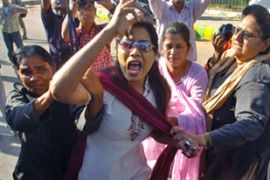Pakistan parties mull poll boycott
Bhutto served 7-day detention order on eve of planned protest rally against emergency.

Published On 12 Nov 2007
Musharraf’s decision on Sunday to hold parliamentary elections on schedule in January came after the US and other Western nations expressed concerns over the possibility of delays.
Condoleeza Rice, US secretary of state, said she was concerned that Musharraf had not set a time limit for the end of emergency law.
“It’s not a perfect situation,” she said on Monday.
Pro-Western figures
The US and Britain had quietly supported talks between Bhutto, a former prime minister, and Musharraf, hoping to unite two pro-Western figures and have them crack down on al-Qaeda and Taliban fighters.
Bhutto also promised to go ahead with a protest march planned for Tuesday and urged Pakistanis of all shades to join the motorcade protest – a three-four day procession from the city of Lahore to Islamabad.
The Pakistan People’s Party, led by Bhutto, has said there could be violence if security forces attempt to stop the rally.
A government spkesman said she risked being placed under a restraining order.
Later, she was served a seven-day detention order by the police.
Earlier in the day, police ramped up security for Bhutto, saying they had received intelligence that a suicide bomber was planning to attack her in Lahore.
Sharif party reaction
The party of Nawaz Sharif, another former prime minister currently in exile in Saudi Arabia, has also set its terms for participation in the elections.
Raja Zafarul Haq, the chairman of Pakistan Muslim League, demanded restoration of the constitution, reinstatement of top judges purged by Musharraf and the release of detainees – as well as Sharif’s return from exile.
|
Your Views |
|
“I am very worried and angry – Musharraf should realise that we don’t need him”
Avas, Islamabad, Pakistan
|
“Under the current circumstances it is very difficult to expect there would be fair elections in the country,” he told Associated Press Television News.
“Within the next week there will be meetings and we will finally decide whether to go for elections or agitation.”
Musharraf said on Sunday that there would be no time limit on emergency rule, which he imposed on November 3.
He also said he would take the oath of office for another term as a civilian and relinquish his post as army chief, without giving a precise date.
On Sunday, Sharif told Al Jazeera that Musharraf’s clampdown on Pakistan’s judiciary also needed to be addressed.
“Before we talk about the elections, we should make sure that the judiciary in Pakistan will go back to the way it was before November 3, before declaring the state of emergency. And this is the most important matter,” he said.
“That is why the elections will be useless if they are carried out in the absence of law and without the participation of all parties. Otherwise, the situation will become complicated.”
Under the state of emergency, key figures in the judiciary have been sacked or detained, including Iftikhar Chaudhry, Pakistan’s chief justice.
Commonwealth threat
In another development on Monday, the Commonwealth gave Pakistan 10 days to restore its constitution and ease other emergency measures or face suspension from the 53-nation bloc.
It demanded that Musharraf step down as army chief and release those arrested, as well as ease media curbs.
Don McKinnon, the secretary-general, said that if Musharraf doess not meet its demands by November 22, when Commonwealth ministers meet on the eve of a summit of the bloc in Uganda, then Pakistan will be suspended.
Source: Al Jazeera, News Agencies
